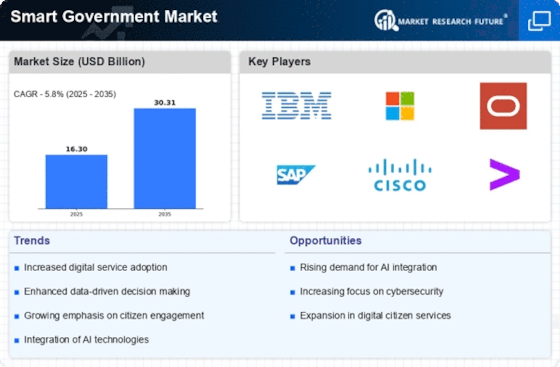Market Analysis
In-depth Analysis of Smart Government Market Industry Landscape
Many aspects affect the Smart Government industry's development. Technology is the most notable component. As technology advances rapidly, so do Smart Government solutions. Integration of AI, blockchain, and IoT into governance systems drives industry growth. This efficiency-boosting innovation boosts transparency and accessibility, driving smart government solution demand.
Another critical determination influencing the smart government markets include cyber security concerns. The risk increases due to online storage of sensitive data from digitized governmental operations. Hence strong cybersecurity methods are required to protect vital information. Governments’ emphasis on cybersecurity determines their adoption rate of Smart Government solutions with emphasis on secure and resilient systems.
Smart Government landscape is influenced by market factors such as interoperability and standardization. On the other hand, for these systems to work harmoniously there should be established common standards which makes them to be capable of having open communication and data exchange. This is because efforts on standardization enable different Smart Governments to have a compatible unit thus foreseeing a seamless interconnected ecosystem. Therefore, industry players that give priority towards interoperability while adhering to set standards will gain competitive advantage.
Public awareness and acceptance are critical in the Smart Government market. People are increasingly exposed to technology and expect government services like any other digital service in their everyday lives. Public approval of these initiatives is vital for their success. In this connection, governments that can communicate benefits of such solutions effectively and build public trust contribute positively towards market momentum.
Smart Government market trends are being driven by environmental sustainability considerations. As such, Smart Governments worldwide have been designed in line with environmentally friendly goals and sustainable development objectives set by governments across countries. For example, Sustainable Green governance principles that adopt eco-friendly practices as well as energy efficient technologies shape current markets trends thereby influencing decisions made within those organizations whose focus is on sustainability.
Finally demographic patterns affect the marketing dynamics. The composition of a population such as age structure and urbanization rates determines the extent of demand for smart government services. Thus younger generations who are knowledgeable about technology could advocate for sophisticated online approaches that enable direct participation in decision-making processes involving government policies or even take them over in what may appear as an “internet coup.” Need for smart governance where cities produce more than 80% of global GDP has necessitated intervention through smart governments.


















Leave a Comment